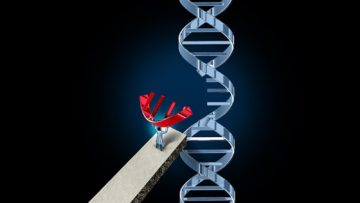Brian Gallagher in Nautilus:
 We’re always thinking about: What are those targets in the future? Cancer is one of those things. The biggest impact is going to be what’s called systemic delivery, or in vivo delivery. There’s been one example of this in the community right now—to treat a liver disease. Intellia Therapeutics, a biotech company, has shown that you can actually intravenously apply CRISPR-Cas9 treatment. (CRISPR is the guide RNA, the targeting molecule, and Cas9 is the cutting molecule that edits DNA.) It can go to the liver and target the liver cells, and make edits at a high enough efficacy to treat genetic liver disease. The problem is that the liver is the easiest. It’s like the garbage can of the body. Pretty much anything that you put into the body is ultimately going to find its way to the liver. So that’s absolutely the easiest tissue to deliver to. But trying to deliver to a solid tumor, or to the brain, is much more difficult.
We’re always thinking about: What are those targets in the future? Cancer is one of those things. The biggest impact is going to be what’s called systemic delivery, or in vivo delivery. There’s been one example of this in the community right now—to treat a liver disease. Intellia Therapeutics, a biotech company, has shown that you can actually intravenously apply CRISPR-Cas9 treatment. (CRISPR is the guide RNA, the targeting molecule, and Cas9 is the cutting molecule that edits DNA.) It can go to the liver and target the liver cells, and make edits at a high enough efficacy to treat genetic liver disease. The problem is that the liver is the easiest. It’s like the garbage can of the body. Pretty much anything that you put into the body is ultimately going to find its way to the liver. So that’s absolutely the easiest tissue to deliver to. But trying to deliver to a solid tumor, or to the brain, is much more difficult.
We’re working on two separate approaches. The easiest one is an antibody. Antibodies can bind to something that’s only found on a specific cell type. And so that antibody could bind, and it could add some level of specificity. Jennifer Doudna’’s group is working on another one, mimicking how viruses attack cells. She’s making something called envelope delivery vehicles. That takes certain parts of a virus’ targeting system to help specifically target a certain cell type, or a specific tissue type. The problem with using full fledged viruses to deliver CRISPR is that they usually stay in the body forever.
More here.
